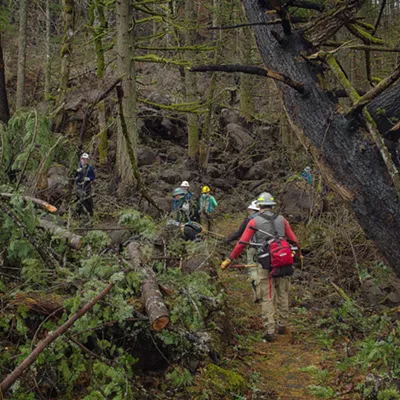If there’s one thing people in Spokane love to complain about, it’s the condition of their streets. From potholes to snow berms, every true Spokanite thinks he or she could do a better job than the yahoos down at City Hall. (Complaining about roads is an art form around here.) So after three weeks of historic snowfall, we decided to take Chief Yahoo Mark Serbousek out for a beer. Serbousek, a bridge engineer for the city since 1993 and the head of the street department for the last two years, declined our offer of ale (he was still on the clock) but did fill us in on his department’s best practices and the reason you see plow trucks driving around with their plows up.
Inlander: If the gripes and complaints of snowbound Spokane citizens are true, then you must be a complete dumbass.
Serbousek: [Laughs] That Wednesday [Dec. 17] when the snow came, we had equipment out de-icing, taking care of the snow. But the snow kept coming. By that afternoon, I had called “Condition Red,” a snow emergency. That night, we geared up with additional crews to start fighting. By the next day, we had all of our contract graders in, so we responded very fast.
The problem we had Wednesday was that everybody saw the snow coming, saw the conditions changing, and decided they were going to leave [work]. They all left at once. So what did we have? Gridlock. [We] couldn’t get to the areas [that were most affected]. We had police escorts for some of our trucks.
It didn’t start good, but we got everybody out way faster than we have any other storm. We were into residential streets that night. From then, it was just “go in circles.”
Another question you hear is…
“Why do we plug driveways?” — isn’t it? I’m sure it is. In the early ‘90s, we had a gate that dropped down at the driveways [holding the pushed snow in as they passed driveway entrances, then releasing it as they passed]. But the city has gotten bigger, our department has gotten smaller. We have to deal with more miles of road. To speed up the graders, we got rid of the [gate], too. The gate works well with six inches of snow. After that, it starts flowing over the blade [and becomes pointless].
Yes, it put more responsibility onto the citizens. Especially in the older community and the handicapped community, we heard a lot of complaints. We look for everybody to help. In my neighborhood [near Whitworth], we took care of about five families. The county, they’ve never had the [gate] system, and they’re used to it.
But talk about a no-respect job. You and your guys were some of the most hated people in the city over the last month. One city plow driver had a gun wielded at him. A private contractor was actually shot at.
We have shovels thrown at us. We’ve had parents put their kids in the driveway entrances, so we have to go around. The hands flying, chunks of snow flying at us. You name it, [we] get it. And [we]’re trying to provide a service so these people can get [around]. Or get emergency services.
What do you say to people who allege you guys weren’t properly prepared for this?
We had nine contract graders. We hired the grader with an operator. We had many sewer and water employees [who] typically don’t work in our department, but we bring them over to fill the equipment. We set up a plan ahead of time. Most contractors were on contract prior to snow coming. That’s something we instigated after last year’s storm.
[But] what level of service do you prepare for? And at what cost?
Do you salt the streets?
Yes. We use liquid magnesium chloride. And we have a rust inhibitor. We salt, but we had temperatures of 15 degrees below, and salts don’t work at that temperature and below. At that point, we went to sand. We went through a lot — every week, about 400 tons of sand.
Someone wrote in our “Jeers” section last month: “Why do I see so many plow trucks driving around with their plows up?” What’s the deal?
We’d never get to our targeted routes if we have to [plow along the way]. You may have an inch or two on this arterial, but they have 10 inches they’re going to. Plus, if they’re just a single truck, they just leave a mess in the street.
People are pissed, too, that STA almost completely shut down when the snow hit.
We have our trucks chained and ready to go. I’m not going to harp on STA, but they have a standing policy: They do not chain. Portland and Seattle, when they got snow, chained their buses. [Our] buses were stuck on every street.
This calm weekend could be the eye of the hurricane. How are you and your department holding up?
Our vehicles have been running for three weeks nonstop — one guy gets out, the other guy gets in. They’re getting serviced, getting the Band-Aid repairs, getting loaded and ready to go for the next big storm.
The drivers are holding up well. Mostly because they’re off Condition Red! They had three weeks straight with 12 hours a day, without a day off. I was working with them at the shop and helping them sort out problems. And I was working 15-, 16-hour days for a week and a half. Then I went down to about 12-hour days. It gets old.
I had last Sunday off, [but] I plan on taking the whole weekend off. I’m going skiing. [Of course], when I go skiing, I work, too. I’m on the ski patrol at 49 North. It’s kinda funny to [vacation] where there’s even more snow.















